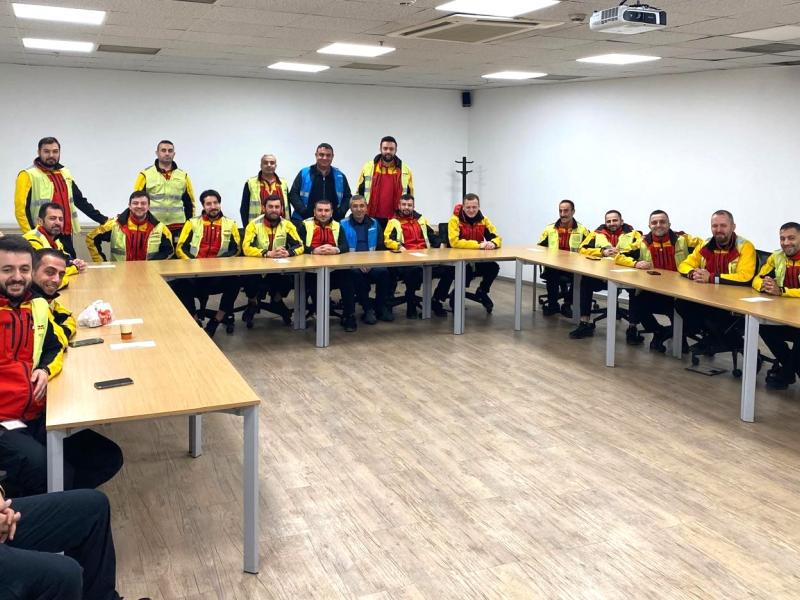After two years of negotiations, the EU has finally adopted the Platform Work Directive. The Council approved the provisional agreement on March 11, aiming to improve working conditions and clarify employment status for platform workers.
The regulation of this growing market was almost stopped by the lobbying of big players in the industry but it was essential to ensure a level playing field for gig economy workers. The pressure that European Transport Workers’ Federation (ETF), the European Trade Union Confederation (ETUC) and their affiliates have put in recent weeks was key to ensuring the final adoption of this Directive, which was more than 800 days in the making.
A Compromise with progress
While the agreed text falls short of what unions initially hoped for, it represents a significant step forward. A key element is the introduction of a presumption of employment at the national level. This tackles the widespread issue of misclassified "bogus self-employed" workers, by focusing on the level of control and direction platforms exert over them. Importantly, this presumption will not undermine existing national rulings that have already reclassified platform workers as employees.
Key Provisions include:
- A presumption of employment was introduced in all member states. This will be an improvement on the status quo and there are no criteria for platforms to find loopholes. The presumption must be based on the control and direction platform companies have over riders/drivers.
- The burden of proof will not be on the worker. The proceedings deciding employment status will not increase the burden of requirements on platform workers or their unions. It will be up to Platform companies to prove they’re not employees.
- Protection against the abusive use of third-party intermediaries to circumvent protections for workers under the Directive.
- Provide controls and inspection by national authorities, where appropriate, when a platform worker is recognised as an employee. There is an obligation for targeted inspections.
- Strong trade union rights to represent platform workers and start reclassification proceedings, communicate with members via unmonitored channels through the app or otherwise, strong recognition of trade union in recitals, promotion of collective bargaining in platform work.
- Exchange of information and best practices between different Member States on the functioning of the respective legal presumptions of employment with European Commission involvement.
- Occupational safety and health risk assessments including on the impact of automated decision making and the prohibition of oppressive systems that put workers physical and mental health at risk.
- Regulation of algorithmic management in the workplace that will give important rights to workers and unions including:
- Protection against algorithmic discrimination and bias
- Workers have a right to challenge decisions taken by automated systems.
- Complete prohibition on ‘robo-firing’
- Unions will get information and consultation rights on how automated systems are introduced, in practice.
Checks on the use of automated systems to process sensitive data relating to trade union activities
Looking ahead: enforcement is crucial
The European Trade Union Confederation (ETUC) has emphasised the importance of robust enforcement by member states. The recent court case in Portugal, where a platform worker was reclassified as an employee, highlights the potential of the presumption of employment. However, platform companies will likely appeal such decisions.
Livia Spera, General Secretary of the ETF, said: "This is a turning point in the fight to give millions of platform workers their rights. It shows what can be achieved at European level when workers, trade unions, politicians and policymakers work together. Members states must now move quickly and ensure a consistent, full implementation and enforcement across the EU. "
Stephen Cotton, General Secretary of the International Transport Workers’ Federation (ITF) said: “This is a major win for platform workers and their unions in the face of a hostile and well-resourced campaign from the platform lobby. It also shows that ‘platform exceptionalism’ is a fallacy and that workers’ rights are not incompatible with work in the platform or gig economy. This Directive was only possible thanks to progressive forces in EU institutions and thousands of platform workers and their unions who never relented in their advocacy.”
The number of platform workers has skyrocketed in recent years. Effective enforcement of the Platform Work Directive, alongside strong national legislation, will be crucial in ensuring they are afforded the rights and protections they deserve.
“Together with ETF affiliates, we will monitor the transposition, implementation and enforcement of this Directive closely and push national authorities to act. This will be key to ensuring a consistent implementation across member states," added Spera.



